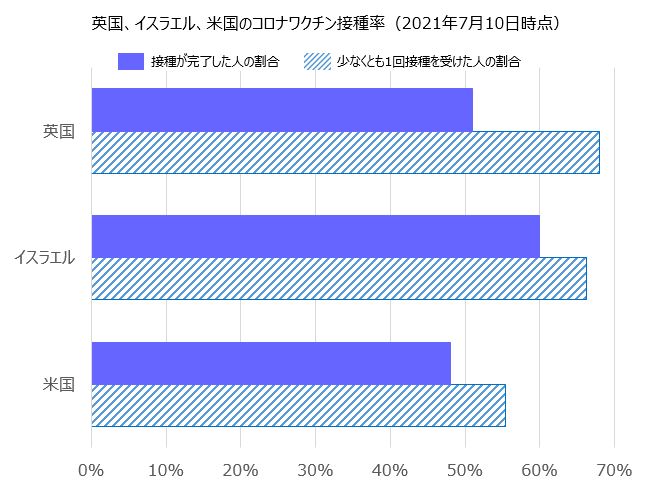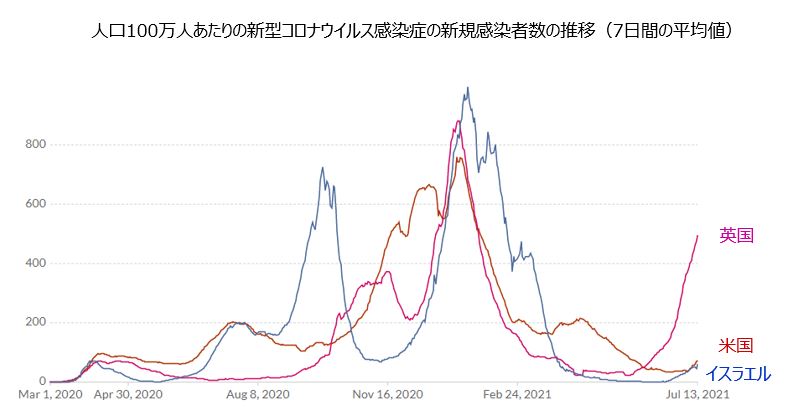
Release date: 2021.07.14
In Israel, the United Kingdom, and the United States, which are considered to be "advanced countries" for vaccination against the coronavirus, vaccination against the coronavirus has taken precedence, and restrictions on behavior have been greatly relaxed. We have achieved a new post-corona normal and are attracting attention from around the world, but now we are seeing an increase in the number of new corona infections due to the influence of the Indian-derived mutant strain “Delta strain”. We will report on the current situation and challenges of corona infections in these countries.

In Israel, where the pace of corona vaccine vaccination is the fastest class, Pfizer's vaccine was started in December last year, and nearly 60% of the population of 9.3 million people, 5.1 million people, have completed the second vaccination. The number of new infections per day has decreased to a dozen or so, and in June of this year, most of the restrictions on movement were lifted. However, since mid-June, the epidemic of the Delta strain has spread through travelers from overseas, and in July, the number of new infections exceeded 500 on some days. Approximately 90% of new infections were thought to be delta strains, and more than half were vaccinated. Dozens of critically ill patients. For this reason, from mid-June, wearing a mask indoors has become mandatory again.
According to a report released by the Israeli Ministry of Health in early July, two doses of the Pfizer vaccine against new coronavirus infections were 64% effective in preventing the onset of new coronavirus infections, and 93% effective in preventing severe disease. is. In the report in May, both the onset prevention effect and the exacerbation prevention effect were over 95%. It has been pointed out that the reason for the decrease in the onset prevention effect is the influence of the delta strain and the relaxation of activity restrictions.

Created based on Our World in Data aggregation
In the UK, which is said to be one of the countries where vaccination is progressing, in December last year, vaccination was started ahead of the western countries with rock down. Even people without medical qualifications are involved in vaccination work and promote large-scale vaccination. Pfizer and AstraZeneca are the main inoculations, and Moderna has been added since April. As of July 4, 86% of all adults had completed the first dose, and 64% had completed the second dose (as of July 10, 66.2% of the population had Second completion: 51% of the total population). The number of new infections was about 2,000 per day in mid-May, but since late June, it has remained at a high level of 20,000 per day. 95% of this is attributed to Delta stock. On the other hand, as of July 1, the number of hospitalized patients is about 1,700, and the number of new deaths is limited to 20. It is said that many of the severe cases are those who have not been vaccinated or who have been vaccinated once.
In the United Kingdom, from January this year, while the production and distribution of vaccines were delayed, in order to raise immunity to a certain level for many people, the vaccination period was set to 12 weeks and priority was given to the first vaccination. According to the results of a survey conducted by Public Health England in May, two doses of the Pfizer product were effective in preventing the onset of Delta strains by about 88%, but only one dose was only about 33% effective. did. AstraZeneca's effect was halved compared to two inoculations. Under these circumstances, the British government plans to abolish almost all behavioral restrictions in England, where the population is concentrated, on the 19th of this month. There is also a view that the UK has steered in the direction of aiming for symbiosis with Corona.

Our World in Data Center for Systems Science and Engineering, Johns Hopkins University Based on COVID-19 Data
According to the US Centers for Disease Control and Prevention (CDC), about 55% of the total population (about 183 million people) in the United States, which is ahead of corona vaccination, received at least one corona vaccine, and about 47% Completed the number of inoculations required to acquire immunity. In the United States, Pfizer, Moderna, and AstraZeneca (both of which are two doses) are licensed, as well as Johnson & Johnson, which provides immunity with a single dose. In addition to differences in the progress of vaccination by region, vaccination is said to be sluggish, especially among young people. The number of new infections has been around 15,000 per day since July, showing an upward trend compared to one week ago. The number of deaths is about 160 per day. The delta strain is believed to account for the majority of new infections. Preliminary data collected in several states across the country over the past six months found that 99.5% of coronavirus deaths were unvaccinated, according to the CDC. In the United States, vaccinated people are not required to wear masks indoors or outdoors, regardless of the number of people (however, public transportation, airports, train stations, etc. will continue to require those who have completed vaccination to wear masks). must be worn).
In countries where vaccination is advanced, "breakthrough infection" is attracting attention, and there are cases where a positive reaction occurs in the PCR test even after two weeks or more after two doses of vaccination. Israel reports that the risk of reinfection increases 6 months after the second dose. It is thought that the risk of reinfection arises because the antibody decreases. According to a Pfizer study, a third dose (booster) can increase antibody levels by 5 to 10 times that of the second dose. The company plans to conduct a 10,000-person booster trial soon. And we are going to apply for approval of the booster vaccination from the European and American regulatory authorities. In addition to the delta strain, it is expected that the delta plus strain, which is a further mutation of the delta strain, and the lambda strain, which is rampant in South America and Peru, will spread. Especially among the elderly, those whose antibody levels, which indicate their ability to prevent infection, do not rise easily. A case of infection is considered, and a booster vaccination may have an important meaning.
MEDIUS Group is developing a business centered on the sale of medical equipment. We (Medical + us) involved in medical care also want to play the role of an information source (Media) that delivers useful information for the medical field and people's healthy tomorrow.